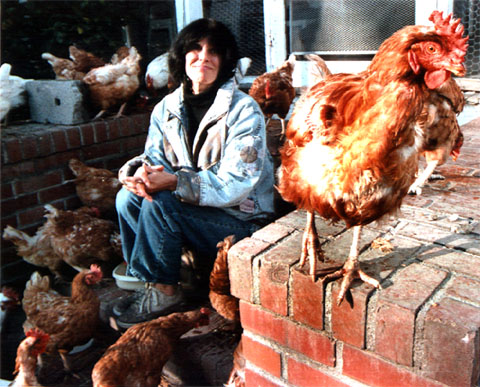Photo above: Karen Davis with some of her chickens at United Poultry Concerns
I first met Karen Davis at least 25 years ago at the State House in Annapolis. To my surprise as I read Tom Horton’s piece, Karen is still pursuing her quiet crusade to reform and ultimately abolish the commercial poultry industry, the major employer throughout the Eastern Shore.
Len Lazarick, [email protected]
By Tom Horton
Via Bay Journal News Service
Washington, D.C.—The big posters spread along the grassy edge of Lafayette Park arrest the young mother’s attention as she passes by the adjacent White House. “Be glad you’re not a chicken,” she says to her child.
It’s a perfect, mid-Atlantic spring day, trees freshly greening the capital’s parks, ospreys sky dancing over the Tidal Basin, rockfish spawning farther down the Potomac; a time to celebrate nature—including chickens.
It’s the nature of the chicken, disguised by generations of breeding for maximum meat and egg production, that Karen Davis and her small band of volunteers are here to impress upon whomever will listen.
International Respect for Chickens Day
The activist from Machipongo on Virginia’s Eastern Shore annually declares this International Respect for Chickens Day (and month). She’ll be back in November to respect the turkey, as the Obamas across the street sit down to a traditional Thanksgiving feast.
I take my Salisbury University environmental studies classes to the little sanctuary Karen has run for around 25 years as founder and president of United Poultry Concerns, a nonprofit claiming membership of 15,000.
My aim’s not to make them animal rights activists or vegans; rather to make them think.
Students at SU will spend their four years in a region that annually slaughters more than half a billion meat chickens. They will study in buildings—Perdue Business School, Fulton Hall, Guerreri Center—named for donors who made their fortunes on chickens.
My class hears from David Pollack, who was Perdue Farms’ head geneticist, about all that’s been bred into the modern chicken to put it economically on your table six weeks out of the egg.
Retaining the essence of wild fowl
But breeding in rapid weight gain, even feathers to distinguish male from female chicks, doesn’t mean breeding out the essence of the wild jungle fowl from which all chickens are descended, Pollack acknowledges.
This is clear when we enter the compound in Virginia where Karen, tends more than a hundred chickens, turkeys and ducks; lives and writes books like “Prisoned Chickens, Poisoned Eggs” and fact sheets like Philosophic Vegetarianism.
Against a background of cackling and crowing, she lectures on the abuses of factory farming like the professor she was (English literature, University of Maryland, College Park). As we talk, chickens run freely, a lilt and a bounce to their gait; they sunbathe, wings spread to soak up Vitamin D; they dust-bathe, fairly wallowing in the soft earth, filling their feathers with it. Roosters perform little courtship dances for hens.
Chickens perch, chickens scratch and peck after insects, socialize with one another. Karen calls theirs a “joyful” existence, and it does seem so. All of this, she says, is denied them in the crowded, artificially lit confines of the broiler house or the caged confinement systems for egg layers (broiler, or meat production and egg production are different businesses that use different breeds of chickens).
Social and smart
Karen cites research showing chickens are social creatures who see the world in full color and with an intelligence—“cognition is a better word,” that is surprisingly sophisticated.
This is all subjugated to the pursuit of cheap, abundant meat and eggs, whose production pollutes the water and gives us an unhealthy level of protein intake (about double our needs), she argues.
She has no illusions what she’s up against in asking Americans to like chickens, when what most really like is chicken.
Back at the White House she’s in conversation with a curious District of Columbia cop, who looks at some of the grislier posters: egg layers with big tumors, meat chickens hanging upside down, throats slit. He politely but firmly declares, “I like eating chicken.”
Most of the UPC leaflets, which include meatless recipes, are handed out and Karen and her small band, in T-shirts that say “Too Neat to Eat,” and “Give a Cluck, Go Vegan,” are closing up shop. “Since I started this, there has been a huge increase in the positivity of people’s reactions,” she said.
Lost cause or a good cause?
Another reason I take my environmental students to Karen’s little sanctuary in the heart of commercial chickendom: Many may end up trying to save a world that often acts as if it doesn’t want to be saved. Avoiding burnout is a skill they will need.
“A lost cause doesn’t mean it’s not a good cause,” she tells them. She doesn’t feel her cause is lost, just a long slog, as was civil rights, gay marriage, women voting.
I came to Washington partly out of respect for chickens, but also out of respect for those who fight against all odds, who dare to question whether all the world revolves around humans, much as astronomers believed for more than a millennia the universe revolved around the earth.
Respect for the rest of nature is a lesson we’re still learning.
Tom Horton has written several books about the Chesapeake Bay and the environment and teaches at Salisbury University. Distributed by Bay Journal News Service.






Recent Comments